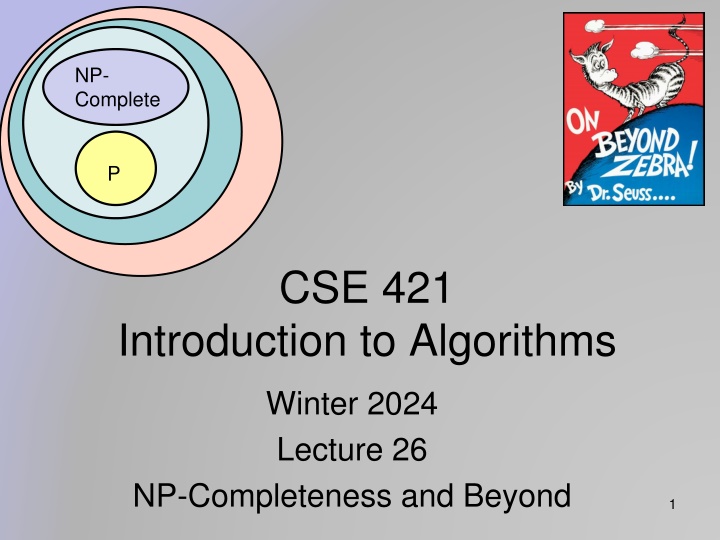
Introduction to NP-Completeness and Beyond in Algorithms
"Explore the fascinating world of NP-completeness, from proving problems are NP-complete to the mysteries of P vs. NP and the potential of quantum computing. Delve into the complexities of cryptography and the challenges of solving NP-complete problems efficiently. Discover the importance of shortest vector problems and how they relate to lattice theory, all within the realm of computational algorithms."
Download Presentation

Please find below an Image/Link to download the presentation.
The content on the website is provided AS IS for your information and personal use only. It may not be sold, licensed, or shared on other websites without obtaining consent from the author. If you encounter any issues during the download, it is possible that the publisher has removed the file from their server.
You are allowed to download the files provided on this website for personal or commercial use, subject to the condition that they are used lawfully. All files are the property of their respective owners.
The content on the website is provided AS IS for your information and personal use only. It may not be sold, licensed, or shared on other websites without obtaining consent from the author.
E N D
Presentation Transcript
http://1.bp.blogspot.com/_0Y-AYb-z8Bw/S--chJjH0JI/AAAAAAAAATU/QngzjH9rMa0/s1600/dr-seuss-on-beyond-zebra.jpghttp://1.bp.blogspot.com/_0Y-AYb-z8Bw/S--chJjH0JI/AAAAAAAAATU/QngzjH9rMa0/s1600/dr-seuss-on-beyond-zebra.jpg NP- Complete P CSE 421 Introduction to Algorithms Winter 2024 Lecture 26 NP-Completeness and Beyond 1
Announcements Final Exam: Monday, March 11, 2:30-4:20 PM One Hour Fifty Minutes Comprehensive (but roughly 60% post midterm) Topics will include: dynamic programming, network flow, network flow reductions, NP- completeness, and other stuff Daylight Saving Time starts 2:00 AM, March 10 2
NP-Completeness Proofs Prove that problem X is NP-Complete Show that X is in NP (usually easy) Pick a known NP complete problem Y Show Y <P X 3
What we dont know P vs. NP P = NP NP-Complete P 4
If P NP, is there anything in between Yes, Ladner [1975] Problems not known to be in P or NP Complete Shortest Vector in a Lattice Factorization Discrete Log Graph Isomorphism Solve gk = b over a finite group 5
What if? 3-SAT can be solved in O(n3) time 3-SAT can be solved in O(n5000) time Factorization can be solved in O(n3) time 6
What about Quantum? Computing with Quantum Devices Superposition of states Complexity Theory: BQP - Bounded Error Quantum Polynomial Time Factorization is in BQP Time (Shor s Algorithm) NP-Complete P BQP 7
Cryptography Standard cryptography depends on number theory problems being hard Keeping factorization secret Practical Quantum computing would break RSA Post-Quantum Cryptography Find other hard problems to base cryptography on 8
Shortest Vector in a Lattice Given a set of vectors L, what is the shortest non- zero vector that can be formed by integer linear combinations of the vectors? The problem is NP- Complete under randomized polynomial time reductions NP-Complete P 9
Complexity Theory Computational requirements to recognize languages Models of Computation Resources Hierarchies All Languages Decidable Languages Context Free Languages Regular Languages 10
Time complexity P: (Deterministic) Polynomial Time NP: Non-deterministic Polynomial Time EXP: Exponential Time 11
Space Complexity Amount of Space (Exclusive of Input) L: Logspace, problems that can be solved in O(log n) space for input of size n Related to Parallel Complexity PSPACE, problems that can be required in a polynomial amount of space 12
So what is beyond NP? http://1.bp.blogspot.com/_0Y-AYb-z8Bw/S--chJjH0JI/AAAAAAAAATU/QngzjH9rMa0/s1600/dr-seuss-on-beyond-zebra.jpg 13
NP vs. Co-NP Given a Boolean formula, is it true for some choice of inputs Given a Boolean formula, is it true for all choices of inputs 14
Problems beyond NP Exact TSP, Given a graph with edge lengths and an integer K, does the minimum tour have length K Minimum circuit, Given a circuit C, is it true that there is no smaller circuit that computes the same function a C 15
Polynomial Hierarchy Level 1 X1 (X1), X1 (X1) Level 2 X1 X2 (X1,X2), X1 X2 (X1,X2) Level 3 X1 X2 X3 (X1,X2,X3), X1 X2 X3 (X1,X2,X3) 16
Polynomial Space Quantified Boolean Expressions X1 X2 X3... Xn-1 Xn (X1,X2,X3 Xn-1Xn) Space bounded games Competitive Facility Location Problem N x N Chess PSpace- Complete Counting problems The number of Hamiltonian Circuits Log Space P 17
N X N Chess 18
Even Harder Problems public int[] RecolorSwap(int[] coloring) { int k = maxColor(coloring); for (int v = 0; v < nVertices; v++) { if (coloring[v] == k) { int[] nbdColorCount = ColorCount(v, k, coloring); List<Edge> edges1 = vertices[v].Edges; foreach (Edge e1 in edges1) { int w = e1.Head; if (nbdColorCount[coloring[w]] == 1) if (RecolorSwap(v, w, k, coloring)) break; } } } return coloring; } Is this code correct? 19
Halting Problem Given a program P that does not take any inputs, does P eventually exit? 20
Impossibility of solving the Halting Problem Suppose Halt(P) returns true if P halts, and false otherwise Define G { if (Halt(G)){ while (true) ; } else { exit(); } } Consider the program G: What is Halt(G)? 21
Undecidable Problems The Halting Problem is undecidable Impossible problems are hard . . . 22
